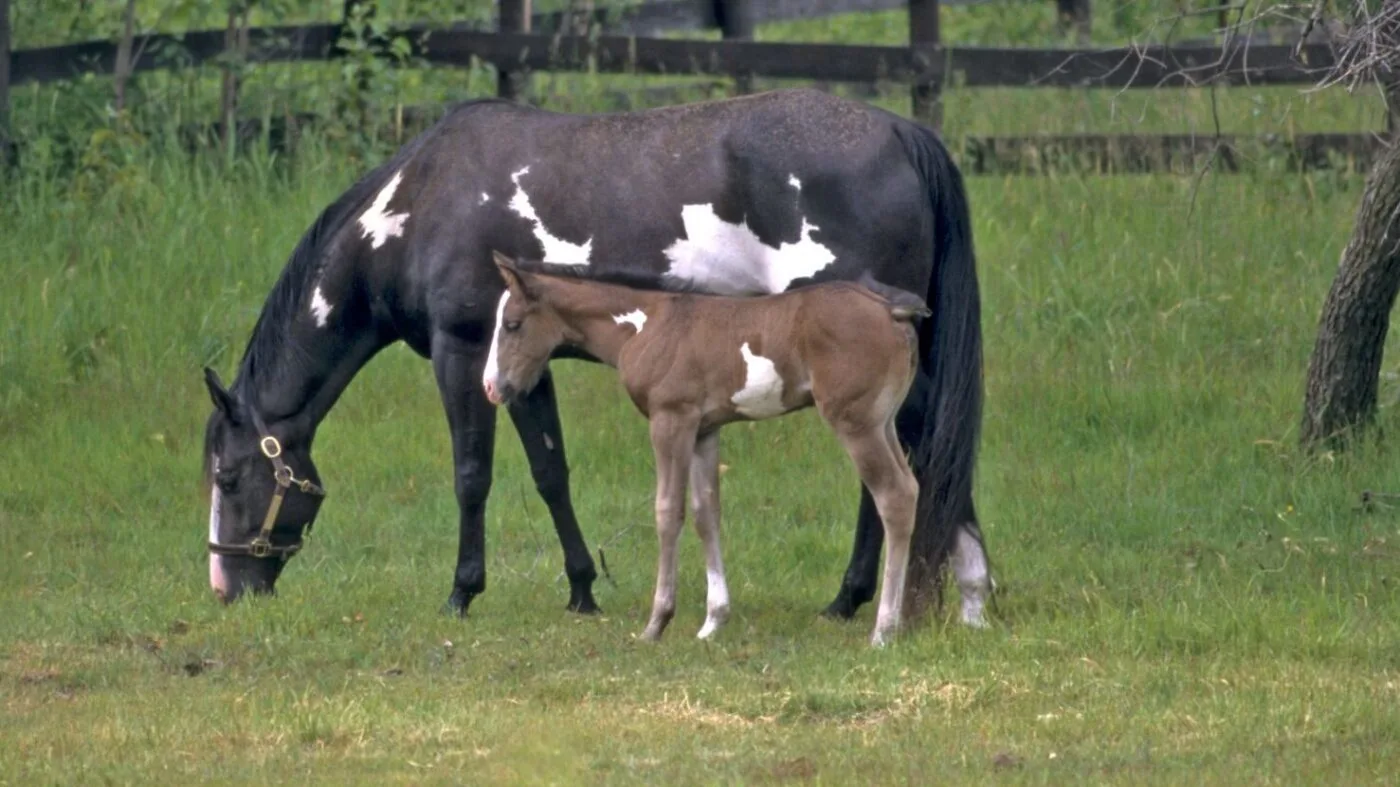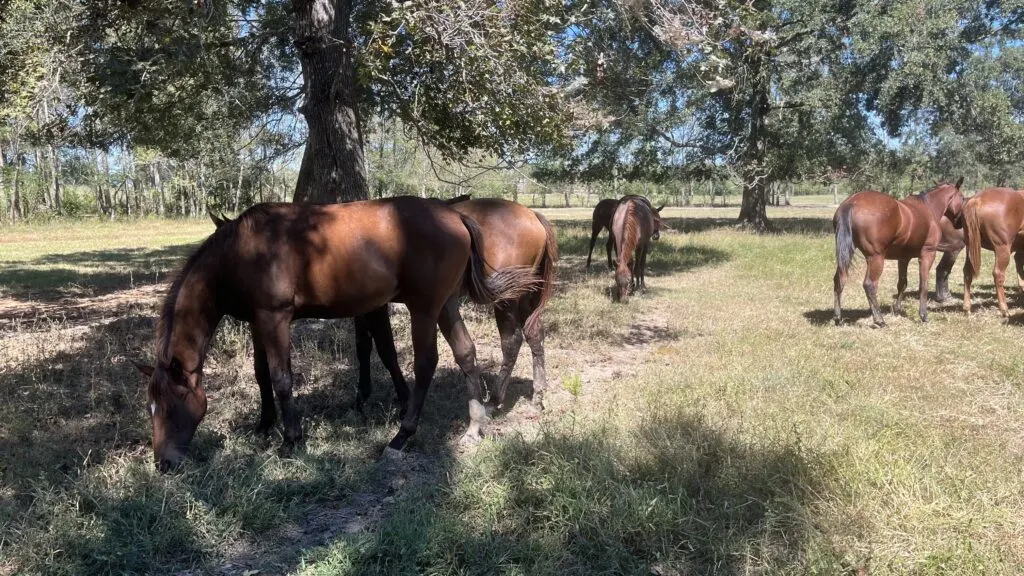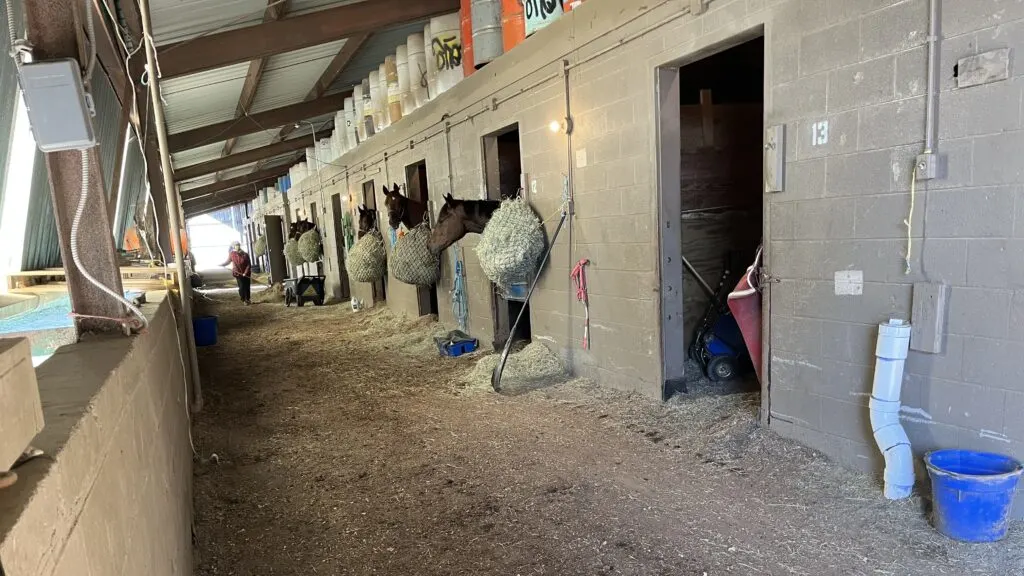Last updated: April 14, 2024
Any links on this page that lead to products on Amazon are affiliate links and I earn a commission if you make a purchase. Thanks in advance – I really appreciate it!
Horses age much faster than humans; for example, a newborn horse can walk within hours of birth, while a human baby may take a year or more to do the same. Understanding these differences is crucial for horse owners and caretakers, as it helps them provide the right food, exercise, and healthcare at each stage of a horse’s life, ensuring their health and longevity.

Basics of Horse Development and Aging
Horses go through several key growth phases, each with its own care needs:
- Foal (0-1 year): Foals stand and walk within hours of birth, needing immediate mobility for bonding and nursing.
- Yearling (1-2 years): Comparable to human teenagers, yearlings grow quickly and need basic training and social interaction.
- Juvenile (2-4 years): In this stage, similar to young adults, horses reach maturity, suitable for more intensive training and possibly starting their working life.
- Adult (5-15 years): Fully mature adult horses are at their most active and require steady maintenance to stay healthy.
- Senior (over 15 years): Like elderly humans, older horses slow down and may develop health issues like joint stiffness, needing more specialized care.
While horses age differently from humans, these stages show that their development sometimes parallels human life stages, helping owners provide appropriate care at each phase.

Understanding Horse Ages in Human Years
Horses grow up much faster than humans, especially in their early years. By two, a horse is already like a teenager in human years. By five, horses are considered fully grown adults.
Early Years: By age two, horses are similar to human teenagers. They mature quickly during these years.
Adult Years: After reaching maturity at five years old, each additional horse year is roughly equivalent to three to four human years. This helps us understand their life stage compared to humans.
When comparing horse ages to human years, it’s important to understand that horses mature faster than humans in their early years. Still, their aging process slows in comparison as they grow older. Here’s how horse years are commonly translated into human years:
Quick Reference Chart:
| Horse Age | Equivalent Human Age | Stage |
|---|---|---|
| 6 months | 5 years | Child |
| 1 year | 10 years | Pre-teen |
| 2 years | 20 years | Young Adult |
| 3 years | 25 years | Adult |
| 4 years | 30 years | Mature Adult |
| 5 years | 35 years | Middle-aged |
| 10 years | 50 years | Senior |
| 15 years | 65 years | Retired |
| 20 years | 80 years | Elderly |
| 25 years | 95 years | Advanced Senior |
Additional Notes:
- This chart is a simplification to provide a rough comparison. A horse’s specific breed and individual health condition can significantly affect its aging process.
- It’s also important to note that horses’ and humans’ cognitive and emotional development is not directly comparable. This chart is intended primarily to guide care and expectations regarding physical aging.

Factors Affecting Horse Aging
The rate at which horses age is influenced by many factors ranging from genetics to the care they receive. I have found that having a good grasp of these factors can vastly improve a horse’s health and longevity.
Role of Care in Aging
Health Management: Proper nutrition and regular exercise are crucial in slowing aging in horses, much like in humans. Tailoring these elements to each stage of life—from a nutrient-rich diet in youth to adjusted exercise regimes in old age—helps maintain optimal health and extend lifespan.
Regular veterinary check-ups and proactive management of chronic conditions are similarly essential, mirroring preventive health practices in human care.
Genetic Factors and Breeds
Genetic Factors: Just as in people, a horse’s genes have an effect on how fast it ages and how long it might live. For example, just like some families have traits that might make them prone to certain illnesses, horses can inherit traits that could affect their health and lifespan. Some breeds of horses are known for living longer, much like some human families might have many members who live to an old age.”
Breed Lifespan Differences: Like people, different types of horses can have different lifespans. Larger breeds, such as draft horses, often have shorter lives because their size puts more strain on their bodies. This is similar to larger dog breeds, which generally live shorter lives than smaller breeds.
On the other hand, smaller horse breeds like Arabians or ponies tend to live longer, showing how factors like lifestyle, environment, and healthcare also affect horses’ lifespans, much like they do in humans.

Environmental Influences on Horse Aging
Living Conditions
Where a horse lives can impact its health and how long it lives. Horses with lots of space to move and exercise generally live healthier and longer. On the other hand, horses kept in crowded spaces can become stressed and sick more often, which may shorten their lives. This is similar to how people living in better conditions tend to have better health and longer lives.
Climate
Climate also plays a significant role in a horse’s health and aging. Horses in extreme climates face challenges such as increased metabolic strain in cold conditions or dehydration in hot environments. Similarly, humans living in harsh climates may encounter health issues that affect their lifespan.
Healthcare’s Role in Horse Aging
Regular vet visits, including vaccinations, teeth cleaning, and parasite treatment, are crucial for a horse’s longevity. Catching and treating diseases early keeps horses healthy, just like regular check-ups help people stay healthy. This preventive care is essential for increasing both the lifespan and the quality of life for horses.
Managing Chronic Conditions
As horses age, they often develop ongoing health problems like arthritis or breathing issues. Treating these conditions with the right medicines and care can greatly improve their lives and slow their aging. This is similar to how managing chronic conditions in older people can improve their senior years.

“The modern human being not only strives for longevity and optimal health for themselves but also extends these goals to their companion animals.”
The Aging Phenomenon of Horses With Reference to Human–Horse Relations
Conclusion: How Horses Age Compares to Human Years
Understanding how horses age compared to humans is essential for providing the best care as they move through different life stages. Like humans, horses experience various age-related changes that require adjustments in care, nutrition, and medical attention.
By comparing horse ages to human years, horse owners and caretakers can better anticipate and meet the needs of their equine companions at each stage of their lives.
We would love to hear from you! If you have experiences or stories about caring for aging horses, please share them with our community. Your insights could provide invaluable guidance and support to fellow horse owners navigating similar challenges.
Whether it’s a success story, a particular challenge you’ve overcome, or innovative care techniques you’ve employed, your contributions can inspire and educate others. Join the conversation in the comments section below or on our social media pages.
Wonder how old your horse would be in human years? Use our calculator to find out:
Horse to Human Age Calculator
Enter the age of the horse to find its equivalent in human years:
This tool helps provide a fun and interactive way to understand your horse’s age in human terms.
